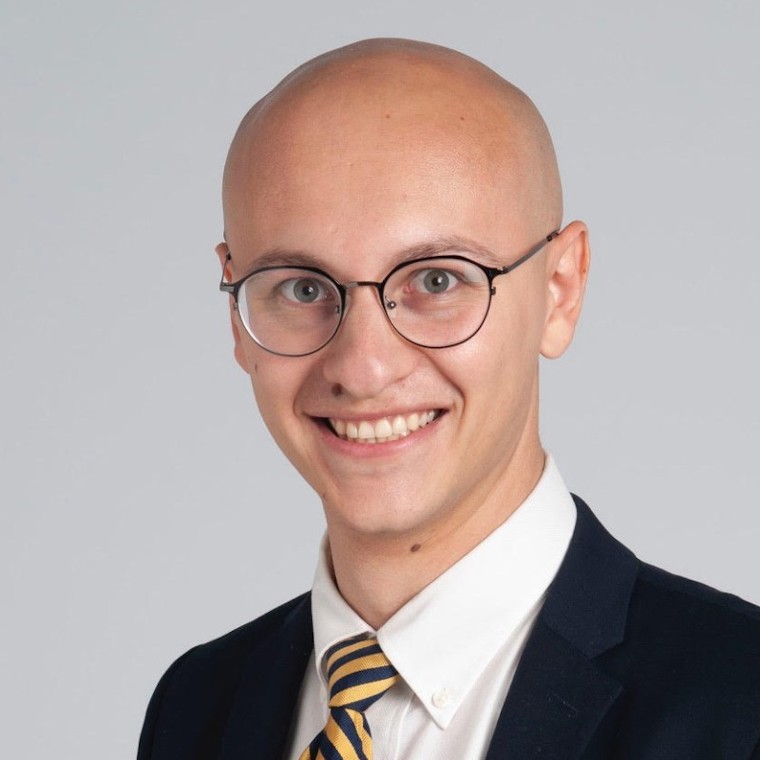This interview is one in a series of interviews with recipients of the 2022 ACGME Awards. The awardees join an outstanding group of previous honorees whose work and contributions to graduate medical education (GME) represent the best in the field. They will be honored at the ACGME Annual Educational Conference, taking place virtually March 30-April 1, 2022.
2022 David C. Leach Awardee Jeremy Weleff, DO is a psychiatry resident at the Cleveland Clinic.
ACGME: Why did you want to become a physician?
Jeremy Weleff: There remains something important to me about being able to hear the stories of so many people's lives, and (hopefully) have the skills to help them through this turbulent, unpredictable, and dangerous thing we call life. There are probably a number of professions where this is the case, but the gravity of the challenges that patients bring to us for help within medicine and psychiatry were the most interesting to me. I was lucky enough to have some great physician mentors before starting medical school to show me the impact of, and beauty in, the doctor-patient relationship. Psychiatry allowed me to bring together my love for science and my love for people’s stories.
ACGME: What, so far, has been the most rewarding part of your residency/fellowship?
Weleff: Outside of regular patient care it is having the time and support to build and strengthen the connections between the (overly) complicated health and social systems to improve patient outcomes. Also, seeing others get excited and enthusiastic about making structural changes to these systems to improve health outcomes for patients and well-being of physicians.
ACGME: What has been the most challenging?
Weleff: Finding that time to do this work outside of clinical demands.
ACGME: What innovation/improvement did you implement in your program?
Weleff: Within our GME and House Staff Association we founded the first Wellness Council (made up of representatives from each program), started a confidential one-to-one peer support network for health care workers, and started an inter-specialty mentorship program. We also started a large initiative to improve health care outcomes for people experiencing homelessness. Starting with universal screening for homelessness and housing insecurity across our emergency departments, we then created a number of pilot programs to improve health outcomes for this group. At the start of the pandemic, we coordinated with other local hospital systems, the county, and other community organizations to ensure that persons experiencing homelessness that were COVID-positive had somewhere to safely quarantine. We made sure these folks had clinical and social work support so they had the best chance of bridging into more stable housing and surviving the pandemic.
ACGME: What does it mean to you to receive this award?
Weleff: I'm so surprised and so thankful. I'm really just glad that people are interested in the work we have done.
ACGME: What advice would you give to other residents/fellows who are looking to either replicate your improvement or implement an original idea of their own in their own program?
Weleff: Look for the helpers—if you don't immediately find a mentor or someone that can knock down (administrative and logistical) walls for you, then keep looking. If you're passionate about changing or building something, then just keep at it. Many of the changes you see were because one person cared enough to pour all of themselves into something and donate their time. When the situation calls for it, sometimes you do have to ask for forgiveness rather than for permission just to show others how important something truly is (to you, your patients, or even your colleague). Find your allies and identify the people that make the decisions. Think about the problem from multiple angles and frame your arguments in the ways that these stakeholders will understand. For example, if you think the changes you want to put in place will improve the bottom line then think about how to tell that part of the story to those that appear to be primarily motivated by these sort of financial concerns (and often make the decisions).
ACGME: Is there anything else you would like to add I haven’t asked about?
Weleff: Just thank you for this award and opportunity.
Learn more about the ACGME’s David C. Leach Award and nominate a deserving individual for the 2023 Award – nominations are due by April 6, 2022.

